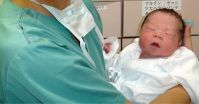(Press-News.org) In a new study, researchers from Uppsala University demonstrate that elderly men with self-reported sleep disturbances run a higher risk of developing Alzheimer's disease than men without self-reported sleep disturbances. The results are published in the scientific journal Alzheimer's & Dementia.
The researchers followed more than 1,000 men, who were initially 50 year old, between the years 1970 and 2010. The results of the study show that self-reported sleep disturbances were linked to an increased risk for Alzheimer's disease during the 40-year follow-up period, particularly if they occurred late in life. The data suggest that a regular good night's sleep could support brain health in men.
'We demonstrate that men with self-reported sleep disturbances run a 1.5-fold higher risk to develop Alzheimer's disease than those without reports of sleep disturbances during a 40-year follow-up period. The later the self-reported sleep disturbance was found the higher the risk was for developing Alzheimer's disease. These findings suggest that strategies aimed at improving sleep quality in late life may help reduce the risk to develop Alzheimer's disease', says Christian Benedict, sleep researcher at Uppsala University, who led the study.
"Importantly, there are several lifestyle factors, such as exercise, that can influence your brain's health. Thus, it must be borne in mind that a multifaceted lifestyle approach comprising good sleep habits is essential for maintaining brain health as you age", says Christian Benedict.
INFORMATION:
Benedict C et al. Self-reported sleep disturbance is associated with Alzheimer's disease risk in men. Alzheimer's & Dementia (in press).
For more information, please contact Christian Benedict, researcher at the Department of Neuroscience, mobile: +46 (0)70-425 02 15, e-mail: christian.benedict@neuro.uu.se or Cecilia Yates, information officer at Department of Neuroscience, mobile: +46 (0)704-334801, e-mail: cecilia.yates@neuro.uu.se
In an earlier article published in the journal Sleep, Christian Benedict and colleagues showed that a single night of total sleep deprivation increased blood concentrations of brain molecules in young men that typically rise in blood upon acute brain damage.
http://www.uu.se/en/media/news/article/?id=3120&area=2,4,10,16&typ=artikel&na=&lang=en
Self-reported sleep disturbances are linked to higher risk for Alzheimer's disease in men
2014-10-28
ELSE PRESS RELEASES FROM THIS DATE:
The early chimp gets the fig
2014-10-28
This news release is available in German.
How do our close relatives, the chimpanzees, acquire sufficient food when times are lean? By studying wild chimpanzees in the Taï National Park in Côte d'Ivoire researchers of the Max Planck Institute for Evolutionary Anthropology in Leipzig, Germany, provide a clear example of how great apes can acquire extra energy needed to maintain large, costly brains. They show that chimpanzees make their sleeping nests more en route to breakfast sites containing fruits that are more competed for by other daytime fruit-eaters ...
Lessons learned from SARS pandemic should inform current contagion protocols
2014-10-28
In 2003, a novel coronavirus caused a pandemic that affected 26 countries. Severe Acute Respiratory Syndrome (SARS) was most prevalent in Asia; the number of cases in Singapore was second only to China.
In an article published in the American Journal of Roentgenology (AJR), a group of radiologists in Singapore outline the ways in which both medical facilities and practitioners there have incorporated lessons learned from the SARS pandemic.
"The pandemic served as a wake-up call for the medical services, which had to respond and reorganize quickly to meet the rapidly ...
Do financial experts make better investments?
2014-10-28
EAST LANSING, Mich. --- Financial experts do not make higher returns on their own investments than untrained investors, according to research by a Michigan State University business scholar.
The first-of-its-kind study analyzed the private portfolios of mutual fund managers and found the managers were surprisingly unsuccessful at outperforming nonprofessional investors. The findings suggest average investors might be better served to handle their own portfolios rather than pay the often-high fees charged by mutual fund managers, said Andrei Simonov, associate professor ...
Identifying the biological clock that governs female fertility
2014-10-28
Researchers at the University of Gothenburg have identified the biological clock that governs female fertility. The discovery represents a major contribution to research aimed at finding medical approaches to treating infertility in women.
Some women can have successful pregnancies at the age of 50, whereas other are unable to get pregnant when they are 30. Researchers are not yet able to fully explain such differences. One factor is that the onset of menopause is influenced by the point at which the uterus runs out of eggs to release.
A recent study at the University ...
New insights into the development of ciliopathies
2014-10-28
"Epithelial cell layers line all of the inner and outer body and organ surfaces in the human body, for example in the lung, intestine, pancreas and in the inner ear," said Moritz Gegg. Cilia – small, hair-like, microtubule-based structures – project from BBs and are precisely positioned on many of these epithelial cells. "Only through this exact positioning can cilia movements be coordinated so precisely that for example mucus can be transported from the lung or sound can be perceived from sensory inner ear hair cells," added Heiko Lickert.
Cilia are anchored ...
Many home blood pressure monitors may be inaccurate
2014-10-28
Philadelphia, PA (October 28, 2014) — Home blood pressure monitors may be inaccurate in up to 15% of patients, according to a study that will be presented at ASN Kidney Week 2014 November 11¬–16 at the Pennsylvania Convention Center in Philadelphia, PA.
Major guidelines recommend home blood pressure monitoring to guide diagnosis and treatment of patients with hypertension; however, little is known about the real-world accuracy of home blood pressure monitors that patients use. Researchers led by Swapnil Hiremath, MD, MPH (Ottawa Hospital and University ...
NUS researchers discover for the first time that a rare bush frog breeds in bamboo
2014-10-28
Researchers from the National University of Singapore (NUS) have discovered a new reproductive mode in frogs and toads - breeding and laying direct developing eggs in live bamboo with narrow openings - which was observed in the white spotted bush frog (Raorchestes chalazodes). This critically endangered frog is currently only one of two species known to adopt this novel reproductive strategy. The findings were published in The Linnean Society of London's Biological Journal of the Linnean Society, in October 2014.
Life history strategies to increase reproductive success ...
Fish 'personality' linked to vulnerability to angling
2014-10-28
Individual differences in moving activity in a novel environment are linked to individual differences in vulnerability to angling, according to an experimental study completed at the University of Eastern Finland and the Finnish Game and Fisheries Research Institute. The study used novel, long-term observations of individual behaviour in groups and authentic angling trials to analyse if behaviours predict the vulnerability to fishing in brown trout reared in traditional and enriched hatchery rearing environments. Based on the results, it can be predicted that fishing modifies ...
When faced with higher prices, swimming is the activity most likely to take a dive
2014-10-28
Experts agree that it's a great way of staying fit and healthy at any age, but when faced with higher prices people are likely to swim less often, while other forms of physical activity such as working out or walking are barely affected.
According to a study by Brunel University London's Health Economics Research Group (HERG), swimming is the individual activity that most people would drop if they faced higher prices.
The study included interviews with 1,683 people, 83% of whom took part in physical activity in some form. It found that people facing 10% higher entry ...
Tea and citrus products could lower ovarian cancer risk, new UEA research finds
2014-10-28
Tea and citrus fruits and juices are associated with a lower risk of developing ovarian cancer, according to new research from the University of East Anglia (UEA).
Research published today reveals that women who consume foods containing flavonols and flavanones (both subclasses of dietary flavonoids) significantly decrease their risk of developing epithelial ovarian cancer, the fifth-leading cause of cancer death among women.
The research team studied the dietary habits of 171,940 women aged between 25 and 55 for more than three decades.
The team found that those ...



